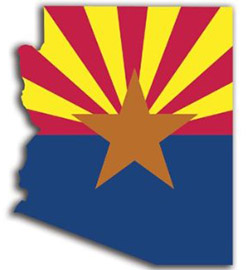As a critical swing state, election season discussions in Arizona are naturally dominated by the presidential race. But look further down the November ballot, and you’ll find a slate of six candidates vying for three seats on the Arizona Corporation Commission (ACC), which oversees the state’s utilities and has the power to approve rate increases that drive up household energy bills.
With Arizonans already facing some of the nation’s highest average energy costs, the six ACC candidates on the ballot should address a critical question of fairness: How will they ensure that Arizona households aren’t forced to foot the bill for the demands placed on the state’s energy grid by the influx of wealthy tech companies and their power-hungry data centers?
Across the country, states are coming to grips with how to handle the wave of new data centers that power digital innovations from cloud computing to artificial intelligence. These data centers are increasingly coming at enormous cost — both to our nation’s infrastructure and to Americans’ wallets. In fact, data center electricity consumption in the U.S. is expected to triple by 2030, while some estimates have found this could have a significant impact on ratepayers. In Virginia, according to one estimate, the average household in the state could see their electric bill double by 2035.
These impacts could be a looming disaster for Arizona, which has rapidly grown into a Western data center hub. According to a new report from the Electric Power Research Institute (EPRI), data center energy demand in Arizona could more than double by 2030. Arizona Public Service (APS), the state’s largest utility, is already struggling to keep up with surging power demands. Without infrastructure upgrades, APS says it will run out of transmission capacity by the end of the decade.
For Arizona families, the result of all this is likely to be ever-increasing energy bills. In February, the ACC approved in a 4-1 vote a rate hike for APS that will add up to $12 to the average household’s energy bills. That rate increase was the latest in a series of ACC decisions that have been criticized by watchdogs in Arizona and opposed by the Residential Utility Consumer Office (RUCO), the state’s ratepayer advocate.
While proponents of data centers argue that they drive economic development, voters should dig deeper into those claims. While a data center may increase local property tax revenues, they create few jobs and economic opportunities for communities. Instead, they consume overwhelming amounts of local resources; not only the electricity necessary to power the facilities but the 1 million to 5 million gallons of water needed every day to keep them cool and prevent overheating — a major issue here in Arizona. And they do all of this while being gifted millions of dollars in taxpayer money to lure them here.
Which brings us back to the question of energy cost fairness voters must ask of the ACC candidates on the ballot in November. Should Arizona families shoulder the cost burden of increased energy demand and the urgent need to upgrade the state’s energy infrastructure. Or should the biggest energy who strain the grid the most pay their fair share?
Arizona is one of just 10 states in the country in which voters elect their public utility regulators (most are appointed by governors), which gives residents here a unique opportunity to have a say in energy policy. The candidates for the Arizona Corporation Commission should lay out their visions for energy fairness so Arizona voters can make an informed choice about the state’s energy future.
For broader energy demand challenges related to data centers, CLICK HERE.
The post Energy Cost Fairness Must Be A Key Issue In ACC Election appeared first on Arizona Informant.











